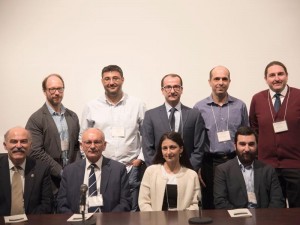
Mouradian, Dr. Yektan Türkyilmaz, and Yaşar Tolga Cora.
Front row, l. to r.: Prof. Barlow Der Mugrdechian, Dr. Stephan
Astourian, Anna Aleksanyan, and Varak Ketsamanian.
Photo: Hourig Attarian
Michael Rettig
Staff Writer
The Armenian Genocide, an atrocity denied by Turkey, was the topic of a major conference bolstering the historicity of what happened in 1915 against denialist claims. On the weekend of March 18-19, the Armenian Studies Program hosted an international conference, “Empire, Politics, and War: The Armenian Genocide within the Context of the Ottoman Empire,” bringing Armenian, Kurdish, and Turkish scholars from around the world to Fresno State.
The Conference was sponsored by the Armenian Studies Program at Fresno State and co-sponsored by the Society for Armenian Studies, as well as the College of Arts and Humanities, with the support of the Leon S. Peters Foundation and the Thomas A. Koouyumjian Family Foundation.
The Conference was the joint idea of Professor Barlow Der Mugrdechian, Director of the Armenian Studies Program, and Professor Ümit Kurt, Kazan Visiting Scholar from Clark University. Kurt explained that the goal of the Conference was not only to discuss the Armenian Genocide, but also to “contextualize it within the framework of late Ottoman history and WWI.” To do this, Prof. Der Mugrdechian and Kurt invited young up-and-coming scholars to share their research.
“It is really a new generation. We wanted to bring young scholars together,” said Prof. Der Mugrdechian. Kurt shared this vision for the conference stating that “it was groundbreaking in terms of getting outstanding young scholars together who meticulously examined the Armenian primary materials.”
The Conference was divided into two parts; Friday evening focused on the events leading up to the Genocide, and on Saturday the Conference focused on personal experiences of the Armenian Genocide through memoirs.
Dr. Stephan Astourian, Director of the Armenian Studies Program at UC Berkeley and the moderator of the first evening, set the groundwork for the Conference with his keynote address discussing the historiography of the Armenian Genocide, as well as examining gaps in certain areas and what progress needs to be made on the “road ahead.”
Dr. Astourian highlighted several aspects of the Genocide that need to be further researched, such as the complexity of Armenian life in the Ottoman Empire. “For instance, Armenian Ottoman life in a coastal town in Cilicia might differ radically from that of a small town in Diyarbekir province. It is not the same Armenian life.” The way historians discuss the Armenians should reflect this complexity rather than lump them into one category.
Varak Ketsamanian’s lecture on “The Hunchakian Party and the Assassination Attempts against Maksudzade Simon Efendi and Khoren Ashekian” reflected this complexity. Ketsamanian opened his presentation by highlighting the differences between Armenian lives in the Ottoman Empire. “There existed a significant gap between the Armenian notables of Istanbul and the provincial Armenians who thought they were strongly underrepresented.” His lecture focused on the dynamics between these provincial Armenians, who mostly joined the Hunchakian Party, and the notables of Istanbul. The first panel concluded with talks given by Anna Aleksanyan, “From Adana to Bolis: Zabel Yesayan’s Letters to Tigran Yesayan in 1909,” and Dr. Yektan Turkyilmaz, on “War and Genocide: Rethinking WWI and the Path to the Armenian Catastrophe.”
The Saturday panel focused on memoirs, such as Yaşar Tolga Cora’s talk on “An Armenian Officer in the Ottoman Army during the Genocide: Memoirs of Kalusd Surmenian.” Cora’s presentation provided insight into the experience of an Armenian officer in the Ottoman army who was able to avoid massacre and retain his position throughout the Genocide. Dr. Khatchig Mouradian followed with his lecture on “Concentration Camps during the Armenian Genocide: Power, Collaboration, and Resistance.”
Professor Der Mugrdechian shared the story of his maternal grandmother in “A Survivor’s Memoir: Siranoosh My Child.” Siranoosh survived the deportation march from her native city of Tokat and eventually reached the United States. Kurt concluded the panel with “Survival Struggles of Aintab Deportees in Salamiyya: Testimonial Accounts of Genocide Survivors Krikor Bogharian and Der Nerses Tavukjian.”
The Conference demonstrated that despite the progress made in the study of the history of the Armenian Genocide, there is still much to be uncovered by the next generation of scholars.
All of this research supports the historicity of the Armenian Genocide, which is not just an Armenian issue, a Turkish issue, or a Kurdish issue, but a historic fact that should be divorced of politics. The Conference provided a prime example of how young Armenian, Turkish, and Kurdish scholars could come together as people and discuss the historical fact that is the Armenian Genocide.
 Hye Sharzhoom Armenian Action
Hye Sharzhoom Armenian Action